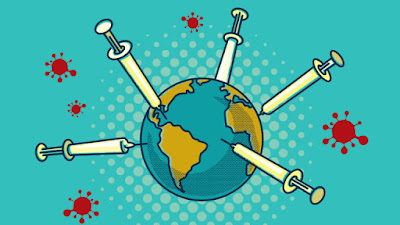Yesterday I had to remind myself of a useful bit of wisdom I ran across in a tweet from author Stephen King: "whenever you feel distressed, remember that Donald Trump is not President." (My recollection of his words; King may have written something much more cogent.)
The announcement that the Biden administration would stick with the Trump limit of merely 15,000 admissions of refugees from around the world put them in the same bag with the lately evicted racist bunch. It was infuriating and seemed also simply ignorant.
Under Obama, the U.S. admitted an average of 70,000 refugees annually, with ups and downs. This isn't a small number, but countries like Canada and Norway admit far more refugees in proportion to their populations. Biden had talked in terms of taking in 60,000, escalating to 125,000 over time.
Trump and Stephen Miller aimed to keep out the Black and Brown, hungry and desperate, out of sheer malice; the Biden administration seemed woefully ignorant of the reality of historic refugee policy. The Pew Center offers a clear summary of how refugee admissions fit in the general immigration picture:
Resettled refugees do not enter
their destination country until they have legal permission to do so,
because they apply for refugee status while in another country. Refugees
are referred by UNHCR and other nongovernmental organizations. The
refugee approval process for the U.S. can take several months or years
while security checks on prospective refugees are completed.
Resettled
refugees differ from those seeking asylum; asylum seekers are people who
migrate and cross a border without first having received legal
permission to enter their destination country.
The refugee process has NOTHING to do with the present crush on the southern border of desperate Central Americans seeking asylum from what they hope is a more sympathetic Biden administration. The Biden folks should have anticipated that development, but it has nothing to do with our refugee policy.
Fortunately, the Biden administration quickly got a lot of push back from people who do know what they are talking about:
... “This Biden administration refugee admissions target is unacceptable,” said Senator Richard J. Durbin, Democrat of Illinois and the chairman of the Senate Judiciary Committee. “Facing the greatest refugee crisis in our time, there is no reason to limit the number to 15,000. Say it ain’t so, President Joe.”
... Maintaining the Trump-era admissions level of 15,000 leaves thousands of refugees stranded in camps in places like Kenya, Tanzania and Jordan. Roughly 33,000 refugees have already been vetted and are prepared to travel to the United States.
“These are two completely distinct pathways and programs,” said Krish O’Mara Vignarajah, the chief executive of Lutheran Immigration and Refugee Service. “America has always been able to walk and chew gum.”
... “President Biden has broken his promise to restore our humanity,” said Representative Pramila Jayapal, Democrat of Washington. “We cannot turn our back on refugees around the world.”
Nazanin Ash, the vice president of policy and advocacy for the International Rescue Committee, said postponing an increase in the cap had real-life consequences.
“This is introducing harmful delays and confusion for refugees who remain in vulnerable situations and want to reunify with their families,” Ms. Ash said.
They sent White House press secretary, Jen Psaki, out to say they'll reconsider in May.
Pressure for refugee admissions is the sort of issue on which the Biden folks can be very usefully subjected to constituent pressure. Let's do it. Here's a smart menu of action suggestions. Lives depend on us.








































